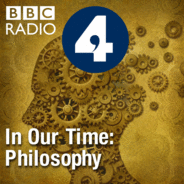Melvyn Bragg examines the philosophy of Confucius. In the 5th century BC a wise man called Kung Fu Tzu said, 'study the past if you would divine the future'. This powerful maxim helped form the body of ideas, which more than Buddhism, more than Daoism, more even than Communism has defined what it is to be Chinese. It is a philosophy that we call Confucianism, and as well as asserting the importance of learning from the past it embodies a respect for heirachy, ritual and parents.But who was Confucius, what were his ideas and how did they succeed in becoming the bedrock for a civilisation? With Frances Wood, Curator of the Chinese section of the British Library, Tim Barrett Professor of East Asian History at SOAS, the School of African and Oriental Studies at London University, and Dr Tao Tao Liu, Tutorial Fellow in Oriental Studies at Wadham College, Oxford University.

Kultur & Gesellschaft
In Our Time: Philosophy Folgen
From Altruism to Wittgenstein, philosophers, theories and key themes.
Folgen von In Our Time: Philosophy
157 Folgen
-
Folge vom 01.11.2001Confucius
-
Folge vom 18.10.2001DemocracyMelvyn Bragg and guests discuss the origins of democracy. In the Gettysburg Address Abraham Lincoln called it “Government of the people, by the people, for the people”, but the word democracy appears nowhere in the American Constitution; the French Revolution was fought for Liberté, Egalité and Fraternité and the most that Churchill claimed for it was that it was “the worst form of government except for all those other forms that have been tried from time to time.” The Athenian city state famously practised participatory democracy, but neither Plato nor Socrates approved, the Romans turned their back on the idea of ‘mob rule’ and it is not until the nineteenth century that it becomes even moderately respectable to call oneself a democrat.So how did democracy rise to become the most cherished form of government in the world? In this programme we hope to trace the history of an idea across the cultures and centuries of Europe and the Middle East. And at a time when ideals of democracy are being thrown into stark relief by world events, we hope to gain a greater understanding of where democratic ideals have come from.With Melissa Lane, University Lecturer in the History of Political Thought; David Wootton, Professor of Intellectual History at Queen Mary College, London; Tim Winter, Assistant Muslim Chaplain at Cambridge University where he is Lecturer in Islamic Studies.
-
Folge vom 28.06.2001ExistentialismMelvyn Bragg and guests discuss existentialism. Imagine being back inside the bustling cafes on the Left Bank of Paris in the 1930s, cigarette smoke, strong coffee and the buzz of continental voices philosophising about human responsibility and freedom. This kind of talk gave utterance to Existentialism. A twentieth century philosophy of everyday life concerned with the individual, and his or her place within the world. In novels, plays and philosophy, Existentialists try to work out the nature of our existence. As Roquentin says in Sartre’s novel ‘Nausea’, “To exist is simply to be there; what exists appears, lets itself be encountered, but you can never deduce it”.But where did these ideas come from? What do they really mean? And how have they impacted on our lives? With Dr A. C. Grayling, Reader in Philosophy at Birkbeck College, University of London; Christina Howells, Professor of French at the University of Oxford, fellow of Wadham College; Simon Critchley, Professor of Philosophy at the University of Essex and author of A Companion to Continental Philosophy.
-
Folge vom 03.05.2001EvilMelvyn Bragg and guests discuss the concept of evil. When Nietzsche killed off God he had it in for evil as well: In Beyond Good and Evil, he constructed an argument against what he called the “herd morality” of Christianity, and he complained "everything that elevates an individual above the herd and intimidates the neighbour is henceforth called evil." Nietzsche claimed that it was a dangerous idea that distorted human nature, ‘evil’ was invented by the church and was a completely alien concept to the noble philosophers of the ancient world. Was he right, did Christianity really invent the idea of evil? And has the idea meant anything more than excessively bad? With Jones Erwin, Lecturer in Philosophy at the University of Limerick; Stephen Mulhall, Tutor in Philosophy at New College, Oxford University; Margaret Atkins, Lecturer in Theology at Trinity and All Saints College, University of Leeds.
